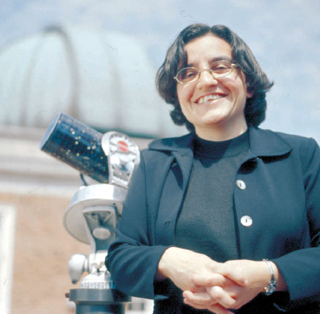

A publication of The Graduate School, University of North Carolina at Chapel Hill
On-Line Version Spring 2004
Home | Back issues | About us | The Graduate School | UNC-Chapel Hill | Make a gift
Finding a key to the universe
Graduate student astronomer discovers new star |
| Photo by Will Owens |
| Graduate Student Mercedes Lopez-Morales’ research in physics and astronomy led to the discovery of a new star. |
Mercedes Lopez-Morales is a small woman, but she packs a lot of punch.
The petite physics and astronomy student has spent the past four years building her own telescope and searching the heavens above North Carolina for an elusive star.
Since 1999, Lopez-Morales has been looking for M-dwarf stars in eclipsing binary systems. These stars are half the mass of the sun or less, she explained, and are in systems with two stars rotating around each other. M-dwarfs are the most abundant stars in the universe, so any planets spotted by astronomers likely will be orbiting such a star.
In order to know more about those planets—their weather systems, physical makeup or ability to support life—scientists need to know how hot and how large M-dwarfs are. Nevertheless, finding those stars and measuring their size is harder than simply pointing a telescope at the sky.
“The main problem is that they’re such tiny little things,” Lopez-Morales said. “They’re so hard to see.”
To facilitate her search for the elusive stars, Lopez-Morales spent two years building a robotic telescope in Asheville that automatically photographs stars every night and transmits the data to her lab in Chapel Hill. Using her telescope, she measured the light outputs of different fields of stars for two-month periods. She reasoned that if one of the stars were in a binary system, its total light output would drop occasionally as one star in the system passed in front of the other.
After spending months analyzing
data from the telescope, Lopez-Morales almost had given up hope of
finding her star. Then, toward the end of 2001, there it was. Only the
third-known eclipsing binary M-dwarf, Lopez-Morales’ star will improve
scientists’ models for M-dwarfs and for the planets that might be
orbiting them.
“What Mercedes is doing is providing really the first chance to get significant calibration of those models,” said Professor Chris Clemens, Lopez-Morales’ adviser. “It is my belief that those models are wrong, and that’s when it’ll get exciting because the theorists will have to rethink the way they model the interiors of stars.”
After breaking this new scientific ground, Lopez-Morales got support from the Royster Society of Fellows to complete her research in her final year as a doctoral student. “Having the fellowship has been very good,” said Lopez-Morales, who received the Linda Dykstra Science Dissertation Fellowship, which is designed to support women and other underrepresented groups in the sciences. “It has freed up my time so I can concentrate on finishing my dissertation.”
Named for donors Thomas and Caroline Royster Jr., the Royster Society of Fellows supports excellence in graduate work at Carolina through both five-year and dissertation fellowships. In addition, the society fosters an exchange of ideas among the fellows through regular seminars and discussions.
Lopez-Morales said seeing what other graduate students are working on has been a highlight of her fellowship.
“If you’re in physics, then all you see every day is physics,” she explained. “Being in the society has given me a broader view of the kind of things you can do out there with what you know.”
A native of the Canary Islands in Spain, Lopez-Morales studied astrophysics at the University of La Laguna before coming to Carolina. After her graduation this spring she hopes to continue her work either with robotic telescopes or in the search for new planets.
“It is so fulfilling,” Lopez-Morales said of her work.
“I can’t explain it. It suits me.”
- Grace Camblos
© 2004, The Graduate School, The University of
North Carolina at Chapel Hill
All text and images are property of The Graduate School
at the University of North Carolina-Chapel Hill. Contact Sandra Hoeflich
at shoeflic@email.unc.edu
to request permission for reproduction.